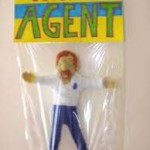Pre-published writers everywhere long to land a top flight literary agent. After all it’s true that you can’t breach the Big 6 houses without one. But many don’t realize that securing representation isn’t always a golden ticket.
Writing Tip for Today: If your agent doesn’t sell your book, is it the agent’s fault, the publisher’s fault or your fault? Let’s look at some possible reasons:
- All Representation is NOT Created Equal. OK, I admit that I once had a top-flight (New York, AAR) agent. She couldn’t sell my first novel. But since, I’ve had a succession of not-so-top-flight agents who couldn’t do a thing for me because they were either inexperienced, inept or unknown. Another reason to heed the adage, “All agents are not equal.” While you swim in a sea of rejection, any agent who says yes may sound tempting. But be sure to vet this person before you sign an agreement. It’s wise to ask about other clients, a list of recent sales, etc. And just because an agent is “top-flight” doesn’t mean that she can sell your book. In fact, an agent with a big agency may spend all his time with “A-listers,” and pretty much ignore you. Check Preditors & Editors before hiring any agent.
- All Publishers have Target Markets. A shotgun approach to submitting, either by your agent or by you (to smaller independent presses) will be largely wasted. When submitting to any editor, be sure your work reflects the target audience. It’s like Cinderella–a perfect fit is the only sure thing. A good agent already knows what publishers are looking for and has relationships with editors. Anything less and you may as well count on the slush pile.
- Is Your Work Ready? You may be screaming, “YES!” But a good agent knows the difference between a writer whose learning curve is still pretty steep and one who’s mastered her craft. Even if your critique group and your mom say your book is the best thing they’ve ever read, look farther for validation. Enter contests that give expert feedback, submit shorter articles or essay to periodicals, attend workshops and conferences to hone your skills. You wouldn’t expect to take up the cello this week and next week be asked to play Carnegie Hall. Writing is a craft. You can learn a craft, but it takes time and practice.
- Retire the Blame Game? Finally, maybe it’s counterproductive to spend all your energy blaming even yourself. Get busy with your practice, write a ton, do your due diligence. If your agent can’t produce for you in a year or two, start looking for an agent who may have a fresh perspective. A pro will understand.






Linda, I would take anything on Editors and Preditors with a huge grain of salt (skepticism). I see errors on that site all the time. I think it’s better to ask your network of publishing friends and if you don’t have a network, then start building one.
I’ve been in some of the top literary agencies in New York and there are some great agents who are actively looking for excellent manuscripts and proposals every day.
You’ve got some great advice in this post. Not all representation is equal. It’s hard to find the right agent. Authors need to actively work at making the right connection. I have a free list of over 400 agents with their names, addresses, emails, phone numbers and websites that anyone can get at: http://terrylinks.com/agents Keep up the good work. Your blog is something I constantly read. Terry
Terry,
Thanks for weighing in on this! You’re correct that P&E sometimes doesn’t get it right. Agent-shopping can be a brutal and unforgiving process. I think that with the fluidity of today’s publishing world, it’s even more confusing. One thing I forgot to mention is the value of writing conferences, where you can meet and talk to agents. So much better than a cold query! Thanks for the link–I hope it helps writers find that right agent. And thanks for reading my blog! ~Linda
I agree with terry. You’re so good at writing about writing. And its so true that not all agents are created equal. I too once had a top new York agent but my novel didn’t sell. It sucks when you assume agent means sale. For the agent too! I love how my agent now pushes me editorially. I think former editors often make the best agents because they’re more likely to add value to a project. Anyway,this is god advice Linda. Keep up the breast work.hugs, h
Heather,
I’m agree–an agent who sees you as a person with thoughts and ideas is preferable to one who only sees your work as a “product.” You’re very lucky to have such a competent agent. And she’s lucky to have you. Thanks for commenting! ~Linda
Linda, I think great care should be taken in picking a critique group as well. If you’re an amateur and your group says your work is the best they’ve seen, you should watch that. An excellent group should be a mixture of pros, newbies, experienced, inexperienced and those in-between. If you find that you’re the smartest person in your group, then that group wouldn’t be of much help to you, especially if you’re not so experienced. While I’m not saying you should abandon such a group, you should find one that will help you with good practical advice to help hone your skills. After all, that is the point of joining a critique group.
Miranda,
You have a great point! In the classes I teach, crit groups often form after the class is over. But if the group is all newbies as you say, they probably won’t make as much progress as if more experienced writers are in the mix. That’s why I teach–to help new writers along. Thanks for your astute comment. ~Linda